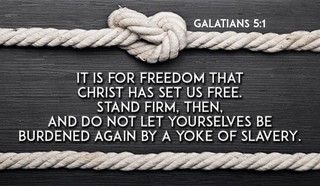- Recent Translations
- All Translations
Galatians 5:11
Share
Settings
Galatians 5:11 Meaning and Commentary
And I, brethren, if I yet preach circumcision
The apostle was traduced by the false teachers, as a preacher of circumcision himself in some places; and this they did partly to show him to be a variable and inconsistent man, who preached one doctrine in one place, and another in another place, and so not to be attended to; and partly with others, to draw them into their scheme upon his authority: what might give them the handle, or at least what they improved to this purpose, might be his circumcising of Timothy; but though he did this as a thing indifferent, and for the sake of the Jews, to make them easy; yet he never preached it after his conversion, and much less as necessary to justification and salvation, as these men did. This calumny he refutes by putting the following question or questions;
why do I yet suffer persecution?
as is clear he did, for being against it, and preaching it down; great part of the persecutions the apostle endured was from the Jews, and that on account of his teaching them everywhere, that were among the Gentiles, to forsake Moses, and that they should not circumcise their children, and walk after the customs of their nation; a clear point this, that he did not preach it; had he, persecution from this quarter would not have followed him; and he could have done it with a good conscience, he must act a very weak part in suffering persecution on that account. The Arabic version gives the words a very different turn, and yet furnishes an answer to the calumny; "why do I persecute him that uses it?" that is, if I am a preacher of it, why am I so warm and violent an opposer of those that submit to it? these things are so opposite that there is no reconciling them; to the same purpose is the Ethiopic version: "then is the offence of the cross ceased". The last mentioned version reads it, "the cross of Christ"; and so the Alexandrian copy; meaning not the cross of affliction, reproach, and persecution, which Christ has enjoined every follower of his to take up and bear for his sake, and is offensive to the carnal man; nor the cross on which he suffered, or the sufferings of the cross; but the doctrine of salvation by a crucified Christ, which was an offence and a stumblingblock to the Jews; now if the apostle had preached circumcision as necessary to salvation, the other doctrine must have been dropped, and consequently the offence taken at it must have ceased, whereas it was not. The Syriac version reads by way of question, "is the offence of the cross ceased?" no it is not, a plain case then is, that the apostle did not preach circumcision, but only a crucified Christ, as necessary to salvation. Moreover, the Jews that believed would not have been so offended as they were at his preaching, had he preached the one as well the other; their offence was not that he preached Christ crucified, but that he preached, that, by the cross of Christ, circumcision and the other rituals of the ceremonial law were now abolished.


